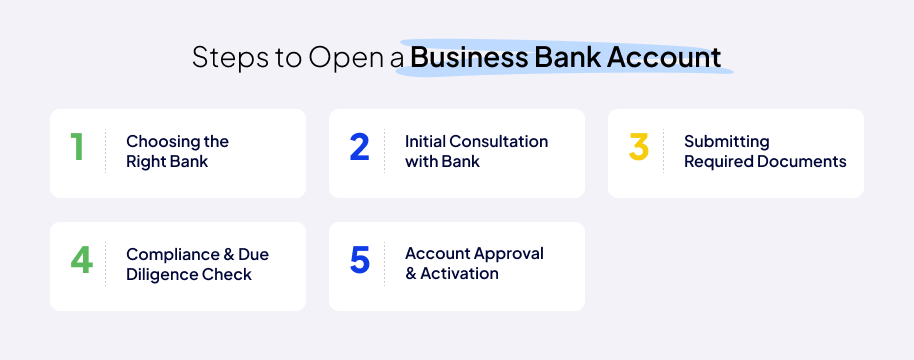When you open a business in Dubai, you open a stream of avenues and revenue. With the inauguration of your business, having a bank account registered with your business name is indispensable.
Opening a business bank account in Dubai is a pivotal step for entrepreneurs aiming to establish a strong foothold in the United Arab Emirates (UAE).
In this guide, I will endeavor to walk you through the process by providing a comprehensive overview of the process, ensuring you navigate the banking landscape with confidence and clarity.
1. Introduction
Dubai, a global business hub, is renowned for its robust banking system, strategic location, and business-friendly environment. With over 50 local and international banks operating in the UAE, the banking sector is a cornerstone of the country’s economy.
In case you’re a startup, a small business, or a multinational corporation, opening a business bank account in Dubai is a critical step to establishing credibility, ensuring financial security, and complying with local regulations.
| But why is a business bank account so important? |
| – For starters, it separates your personal and business finances, which is essential for accurate accounting and tax reporting. |
| – Additionally, it enhances your company’s credibility with clients, suppliers, and investors. |
Did you know that 90% of businesses in Dubai operate with a corporate bank account? This statistic underscores the importance of integrating into the UAE’s financial ecosystem.
2. Understanding the UAE Banking System
The UAE banking system is one of the most advanced in the world, offering a wide range of services tailored to businesses. Here’s a breakdown of the key components:
Types of Banks in the UAE
- Local Banks: These include Emirates NBD, Abu Dhabi Commercial Bank (ADCB), and Dubai Islamic Bank (DIB). They dominate the market and offer extensive services for businesses.
- Emirates NBD: One of the largest banking groups in the Middle East, offering comprehensive corporate banking services, including trade finance, treasury, and digital banking solutions.
- Abu Dhabi Commercial Bank (ADCB): Known for its robust corporate banking services, ADCB provides tailored solutions for SMEs and large enterprises, including loans, credit facilities, and cash management.
- Dubai Islamic Bank (DIB): The UAE’s first Islamic bank, DIB offers Sharia-compliant banking solutions, including Murabaha, Ijarah, and Sukuk financing for businesses.
- International Banks: HSBC, Standard Chartered, and Citibank are popular choices for businesses with global operations.
- HSBC UAE: A global banking giant, HSBC provides cross-border banking services, international trade financing, and multi-currency accounts, making it ideal for businesses with global operations.
- Standard Chartered UAE: Specializes in corporate and institutional banking, offering trade finance, treasury services, and digital banking platforms for seamless global transactions.
- Citibank UAE: Known for its global reach, Citibank offers corporate banking, cash management, and investment banking services tailored to multinational corporations.
- Islamic Banks: These banks, such as Abu Dhabi Islamic Bank (ADIB) and Dubai Islamic Bank (DIB), operate in compliance with Sharia principles, offering interest-free banking solutions.
- Abu Dhabi Islamic Bank (ADIB): Offers Sharia-compliant corporate banking solutions, including profit-sharing investment accounts, trade finance, and SME financing.
- Dubai Islamic Bank (DIB): Provides Islamic banking products such as Mudarabah, Musharakah, and Wakala, catering to businesses seeking ethical financial solutions.
- Emirates Islamic Bank: Focuses on digital innovation, offering Sharia-compliant corporate accounts, trade services, and SME financing with a strong emphasis on technology-driven solutions.
Regulatory Bodies
The Central Bank of the UAE oversees all banking operations, ensuring stability and compliance with international standards. The UAE also adheres to strict anti-money laundering (AML) and counter-terrorism financing (CTF) regulations, making it a secure place to conduct business.
Key Banking Services for Businesses
- Corporate Accounts: Essential for managing business transactions.
- Merchant Services: Enable businesses to accept payments via credit/debit cards.
- Online Banking: Facilitates seamless financial management, including international transfers and payroll processing.

3. Eligibility Criteria for Opening a Business Bank Account
Before you approach a bank, it’s crucial to understand the eligibility requirements. These vary depending on your company structure and the bank you choose.
Company Structure Requirements
- LLC (Limited Liability Company): The most common structure for mainland businesses.
- Free Zone Company: Businesses registered in free zones like DMCC or JAFZA.
- Offshore Company: Typically used for holding assets or international trading.
Residency Status
While some banks allow non-residents to open accounts, having a UAE residency visa simplifies the process. Non-residents may need to provide additional documentation or work with a local sponsor.
Minimum Capital Requirements
Some banks require a minimum deposit to open an account. For example, Emirates NBD may ask for AED 50,000, while smaller banks might have lower thresholds.
4. Documents Required
To ensure a smooth application process, prepare the following documents in advance:
- Trade License: Issued by the Department of Economic Development (DED) or the relevant free zone authority.
- Certificate of Incorporation: Proof of your company’s legal existence.
- Memorandum & Articles of Association (MOA & AOA): Outlines your company’s structure and activities.
- Passport Copies: For all shareholders and authorized signatories.
- Emirates ID and Visa Copies: If applicable.
- Proof of Business Address: Ejari (tenancy contract) or a utility bill.
- Business Plan: Some banks may request this to assess your business’s viability.
Pro Tip: Always check with your chosen bank for any additional requirements, as these can vary.
5. Step-by-Step Process of Opening a Business Bank Account

Step 1: Choose the Right Bank
Selecting the right bank is crucial. Consider factors such as:
- Fees: Account maintenance, transaction, and ATM fees.
- Services: Online banking, international transfers, and merchant services.
- Customer Support: Availability of dedicated relationship managers.
Popular banks in Dubai include Emirates NBD, ADIB, Mashreq, and RAKBANK. Each offers unique benefits, so compare their offerings before making a decision.
Step 2: Initial Consultation with the Bank
Schedule a meeting with a banking relationship manager to discuss your business activities, expected transactions, and compliance needs. This step helps the bank tailor its services to your requirements.
Step 3: Submit Required Documents
Ensure all documents are accurate and complete. Incomplete applications can lead to delays or rejection.
Step 4: Compliance & Due Diligence Checks
Banks conduct thorough KYC (Know Your Customer) checks to verify your identity and assess potential risks. This process may take 1–2 weeks.
Step 5: Account Approval & Activation
Once approved, you’ll receive your account details and online banking access. Most banks also offer assistance with setting up payment gateways and linking your account to accounting software.
6. What Are the Challenges & How to Overcome Them?
High Compliance Standards
The UAE’s strict AML and CTF regulations mean banks scrutinize every application. To avoid delays, ensure all documents are accurate and transparent.
Long Processing Times
Some banks take up to 4 weeks to approve accounts. To expedite the process, choose banks known for faster verification, such as Mashreq or RAKBANK.
Restrictions for Offshore Companies
Offshore companies often face additional scrutiny. Working with a local corporate service provider can help navigate these challenges.
7. Best Practices for Managing a Business Bank Account in Dubai
- Update KYC Details Regularly: Changes in company structure or ownership must be reported to the bank.
- Maintain Clear Financial Records: This is essential for audits and VAT compliance.
- Use Secure Online Banking: Protect your account with strong passwords and two-factor authentication.
- Avoid Suspicious Transactions: Large, unexplained transfers can raise red flags and lead to account suspension.
Final Thoughts
Opening a business bank account in Dubai is a vital step for any company looking to establish a presence in the UAE. By understanding the banking system, preparing the necessary documents, and following the step-by-step process, you can ensure a smooth and hassle-free experience.
Remember, choosing the right banking partner is crucial. Take the time to compare banks and seek expert guidance if needed. With the right approach, you’ll be well on your way to financial success in Dubai.
This guide is designed to be your go-to resource for opening a business bank account in Dubai. If you have any questions or need further assistance, feel free to reach out to a banking expert or corporate service provider. Good luck!




